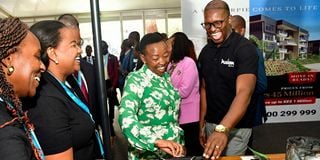Premium
Involve women when planning cities, First Lady Rachel Ruto urges UN forum

Fusion Experience Kenya Limited Business Development and Strategy Brian Nyakeri (right) explains to First Lady Rachel Ruto (second right) the benefits of the half-kilogram home cooking gas during the second session of the United Nations Habitat Assembly of the United Nations Human Settlements Programme (UN–Habitat) held on June 6, 2023, at the UNEP Headquarters in Gigiri.
Women must be at the table when the world plans for its cities, First Lady Rachel Ruto has said .
Addressing delegates attending the second United Nations Habitat Assembly, dubbed #UNHA2, at the UN Environmental Programme (Unep) headquarters in Gigiri, Nairobi yesterday, Mrs Ruto said women, when given the right opportunities and tools, have the power to uplift themselves and their communities.
“The woman is the mirror of society, if she is marginalised, the community is oppressed; if she is empowered, the community is empowered, and so women must be at the table when planning our cities,” she told delegates.
“How about a walkable park and rides for children to go on and run around in green open spaces? This reminds me of my days growing up in Kakamega County and especially sharing that one broken bike with my siblings on the rural roads where we would have the time of our lives as we rolled down the valley at high speed, often without brakes,” the First Lady recalled.
“The feeling of joy and freedom was priceless, ladies and gentlemen, such cities are possible if we commit to being inclusive and sustainable. Today’s theme (Women Shaping Cities and Communities) recognises the role of women in enabling our cities and communities to thrive as a whole,” Mrs Ruto said.
“The city of Vienna is an example we can learn from as we think about how to make our cities more sustainable, especially with women in mind. The government of Vienna has made the city a safer and more comfortable place for women after incorporating a gender lens into urban design,” the First Lady said.
“It has improved street lighting, made parks more accessible to young girls, widened pavements and designed neighbourhoods that cater to the social needs of women.”
Positive strides
She said Kenya has made positive strides through street lighting in partnership with Kenya Power, modernising markets, redesigning public parks and creating new footpaths in major cities.
“Sustainable Development Goal [SDG] 11 focuses on making cities and human settlements inclusive, safe, resilient and sustainable. More than 50 per cent of the world's population lives in cities and, by 2050, an estimated seven out of 10 people are expected to live in urban areas," said Mrs Ruto, noting that, in developing countries, this increase continues to be driven by rural-urban migration in search of employment and business opportunities
“A growing younger generation is another key driver of urban population growth, [which] has led to several challenges such as inadequate housing, growth of informal settlements, inadequate solid waste management, to name a few, as green spaces and tree cover are severely compromised to make way for human settlements,” Mrs Ruto said, adding that the Kenyan scenario is no different from the global experience as urbanisation changes the way Kenyans live.
“It is estimated that by 2030, 34 per cent of Kenyans will be living in urban areas. Kenya has a shortfall of 200,000 houses per year and the government is keen to encourage investment in affordable housing," she said.
The Kenya Kwanza government's bottom-up approach, she said, aims to restore the dignity of informal settlement dwellers.
"It is the goal of every woman to own a house and have the security of knowing that her family has a decent roof over their heads. The Kenyan government has a plan to increase the number of affordable mortgages from 30,000 to 1 million by 2032.”
She told delegates that government investment in affordable and sustainable transport systems and the upgrading of transport infrastructure are key to better managing urban areas.
"I am confident that the outcomes of today's dialogue will go a long way in supporting the achievement of SDG 11 and through SDG 5 (equality) and we will amplify the voice of our women by engaging them in the pursuit of inclusive, safe, resilient and sustainable communities."





